From her balcony on the outskirts of this Lebanese border village, Greta Nakhleh-Allam, 33, can see Israel in almost every direction.
And every morning, when the gunfire between the Israeli army and Hezbollah fighters resumes, one wonders whether the fighting will end or escalate into a raging conflagration.
“I’m tired of this war, I’m tired of our lives,” said Nahle-Allam, her 11-year-old son Jacob looking after the family dog, Bella.
“We thought it would last a week. Then we thought for a month. Christmas is over. New Year’s is over. Easter is over. And we’re still waiting for the war to end. And now they say it’s going to get bigger.”
Members of the clergy celebrate Palm Sunday in Rmeish, a Lebanese village near the border with Israel, on March 24, 2024.
(Muhammad Zaatari/Associated Press)
The question — will the war end or escalate? — is being asked across Lebanon these days, but perhaps nowhere more quickly than in Rmeish. The village of some 11,000 people, the largest of dozens of Christian enclaves scattered across the Hezbollah-controlled south, sits on the front line of a war where few people claim it as their own.
“It’s not our cause. It’s not our job to do it,” said Saeed Allam, a 42-year-old soldier who now owns a supermarket. Sinwar is believed to be the mastermind behind the Oct. 7 attacks in southern Israel that killed nearly 1,200 people and triggered a deadly offensive in Gaza in which health officials say more than 38,000 people were killed.
A day after the war between Israel and Hamas began, Hezbollah – a Shiite Islamist paramilitary group and political party that is part of a coalition with Hamas – fired a rocket into Israel in a “solidarity campaign”. Israel retaliated and Allam saw half of his neighbours join the more than 90,000 Lebanese displaced by the violence; in northern Israel, some 60,000 people have been evacuated.
Economic life has come to a standstill in Rmeish. Most tobacco farmers have been unable to get to the fields and have lost not only their harvest, the main source of income here, but also the opportunity to plant for the next season. Weddings and summer weddings, which generate $2 million a year for restaurants, have been cancelled or moved. And Lebanese migrants, who flock to the village during the holidays, have mostly stayed away.
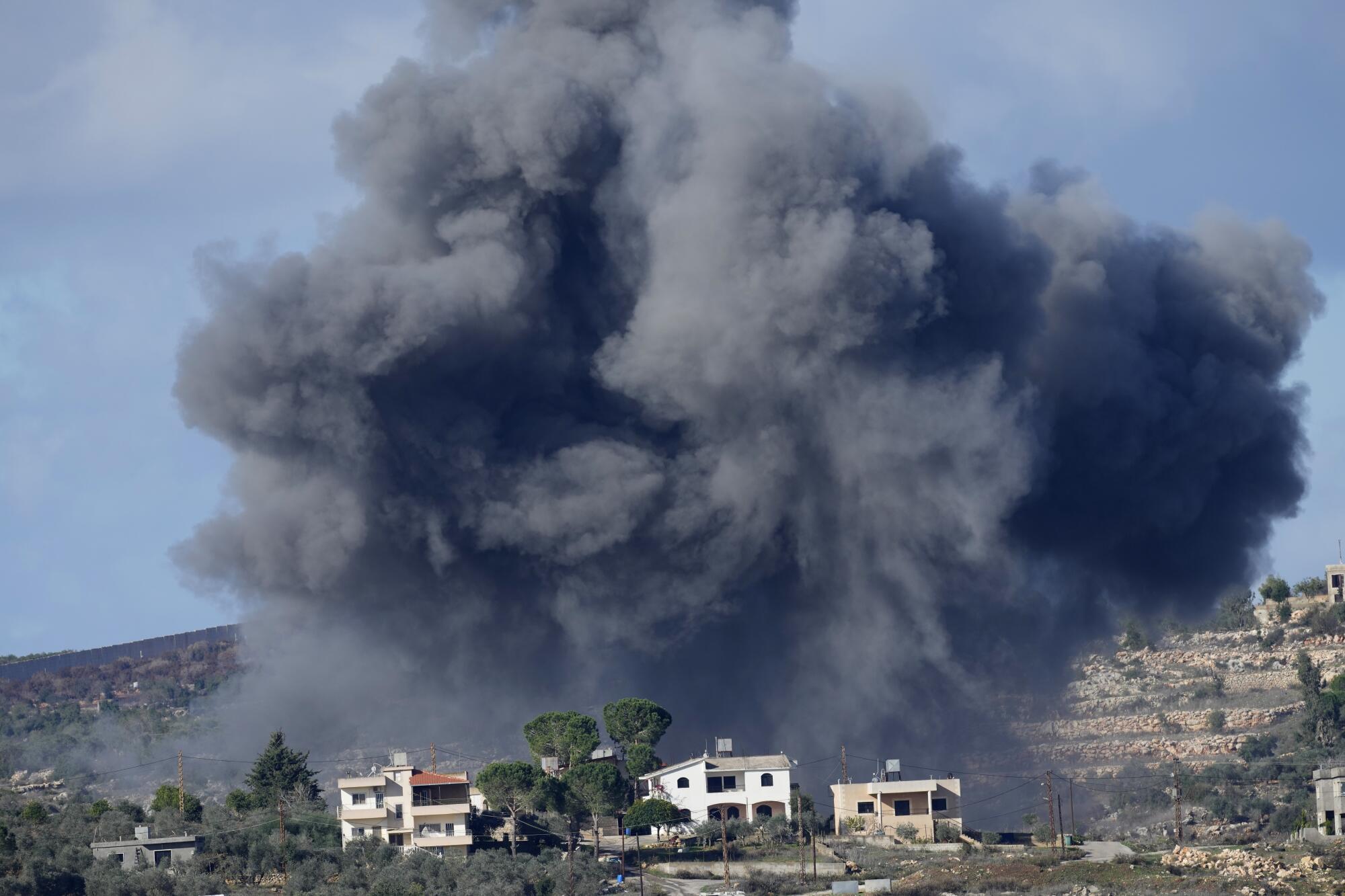
Black smoke rises following an Israeli airstrike outside Aita al-Shaab, a Lebanese border village, as seen from Rmeish, southern Lebanon, November 21, 2023. Tensions are mounting on the Lebanese-Israeli border following an October 7, 2023 attack by the Palestinian militant group Hamas in southern Israel.
(Hussein Malla/Associated Press)
“I invested half a million dollars in this store and I’m watching it lose money,” Allam said, pointing to a row of stocked shelves.
He allegedly turned to Hezbollah and added: “Do you want Jerusalem? Go and take it, but not like this, because you have destroyed everyone with yourself.”
Allam’s frustration, shared by many here, comes down to the core of the conflict over Hezbollah and the broader Lebanese public’s support for the Palestinian cause.
Hezbollah has a long history of conflict with Israel. Its support for Gaza has earned it praise among Sunnis in Lebanon and the broader Arab world, where people compare the group’s activities to the inaction of their own governments.
But many Lebanese also remember the late 1960s, when Palestinian groups turned the south into what some called “Fathom Land” — a reference to Fatah, the largest of them — and used it as a staging ground for attacks on Israel.
In 1982, Israel invaded Lebanon with the aim of driving out Palestinian militants and creating a buffer zone, a campaign that turned into an occupation that led to the rise of an Iranian-backed Shia Islamist group, Hezbollah. After the Israeli withdrawal in 2000, Hezbollah – by then not just a guerrilla force but a well-organized political and social party – held firm, arguing that “Islamic resistance” was the only deterrent against future Israeli attacks.
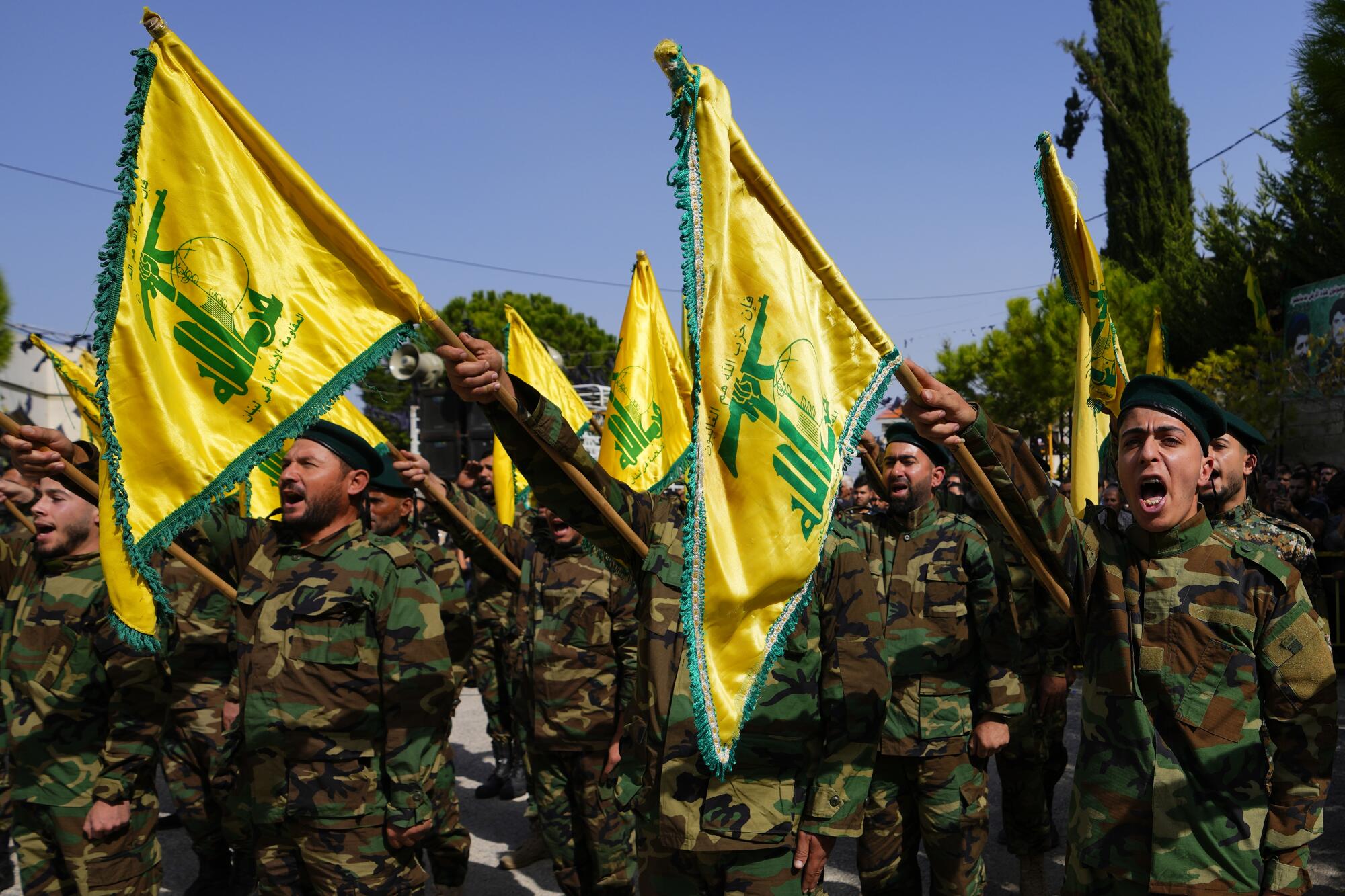
Hezbollah fighters raise their group’s flag and chant slogans as they attend the funeral of Bilal Nemr Rmeiti, a fellow militant who was killed by Israeli fire on October 22, 2023, in the village of Majadel, southern Lebanon.
(Hasan Ammar/Associated Press)
The two sides clashed again in 2006 in a devastating war that killed nearly 1,200 Lebanese, most of them civilians, and saw large parts of Lebanon destroyed by bombs, before ending in a stalemate. Rmeish suffered, though not as much as Shiite villages loyal to Hezbollah. Instead, it became a refuge for some 30,000 people fleeing the violence.
The end of the war brought relative peace. Until nine months ago, the two sides maintained a cautious but cordial distance, exchanging only occasional shots.
In the event of a full-scale war, Israeli authorities have vowed to cause even more destruction than in 2006. Israeli Prime Minister Benjamin Netanyahu recently threatened to “turn Beirut into Gaza.”
But Israeli military planners acknowledge that Hezbollah, with more than 100,000 fighters and advanced weaponry, will be a more formidable foe than Hamas, capable of striking deep into Israel. And Hassan Nasrallah, Hezbollah’s chief, has said any Israeli attack would provoke a war without “limits, rules and ceilings.”
But Hezbollah should consider other Lebanese communities, said Michael Young, a Lebanon expert at the Carnegie Middle East Center.
“Everyone knows that war is the worst option, but Hezbollah threw the country into this conflict,” he said. “Hezbollah knows that if the situation gets out of control, its position will be affected. They want to avoid that.”
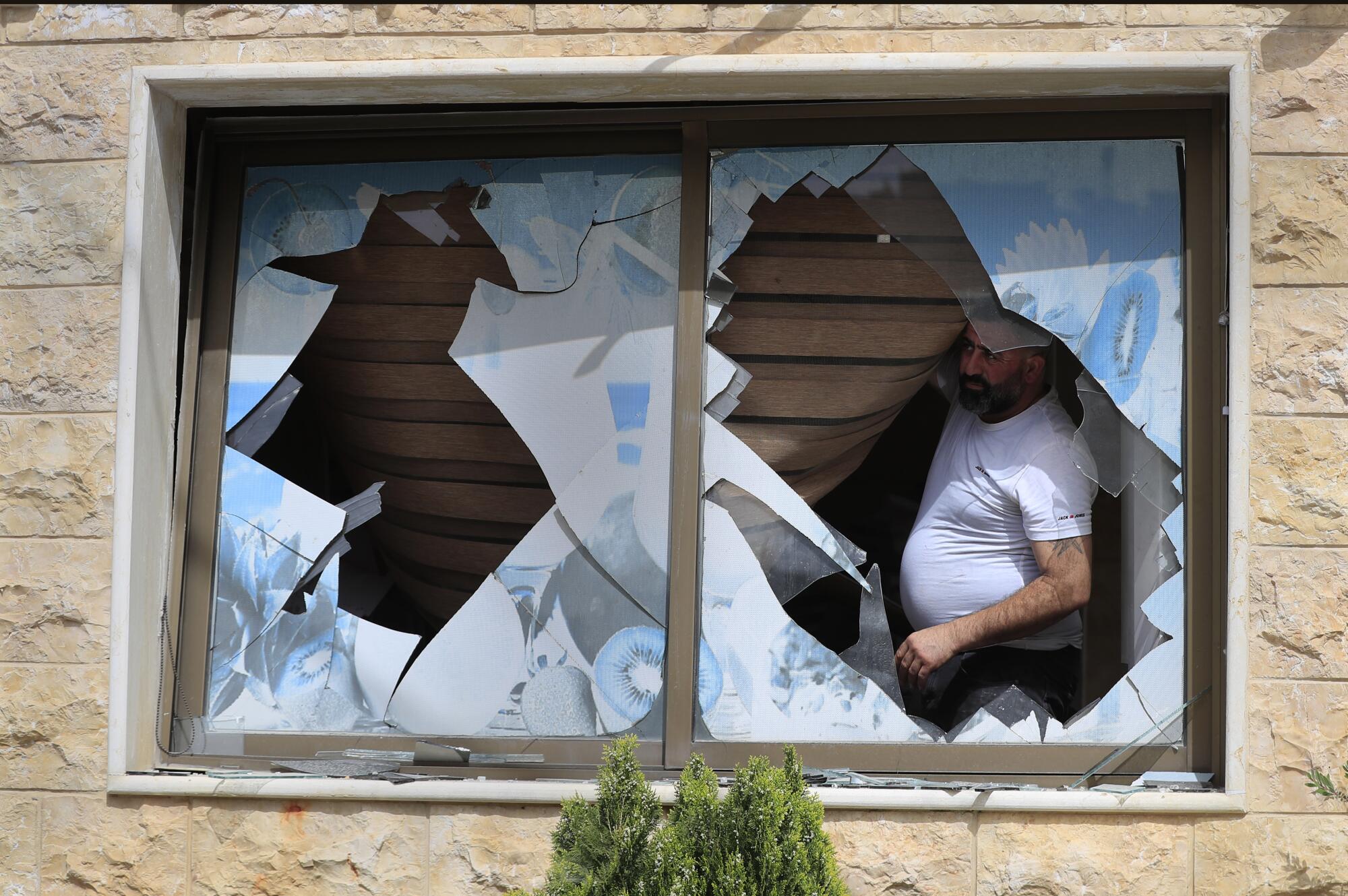
A villager looks through a window damaged by Israeli shelling in Kfar Qila, a village in southern Lebanon near the border with Israel, April 18, 2024. Hezbollah fighters and Israeli forces have been exchanging fire since the start of the war between Israel and Hamas on October 7, 2023.
(Muhammad Zaatari/Associated Press)
Support remains strong, at least externally, among displaced residents of now-empty southern Shiite villages.
“We, the people of the south, our children, sisters and loved ones are being killed to protect our country,” said Balqis Daoud, a 50-year-old housewife from Kfar Qila, one of the worst-hit towns in Israel.
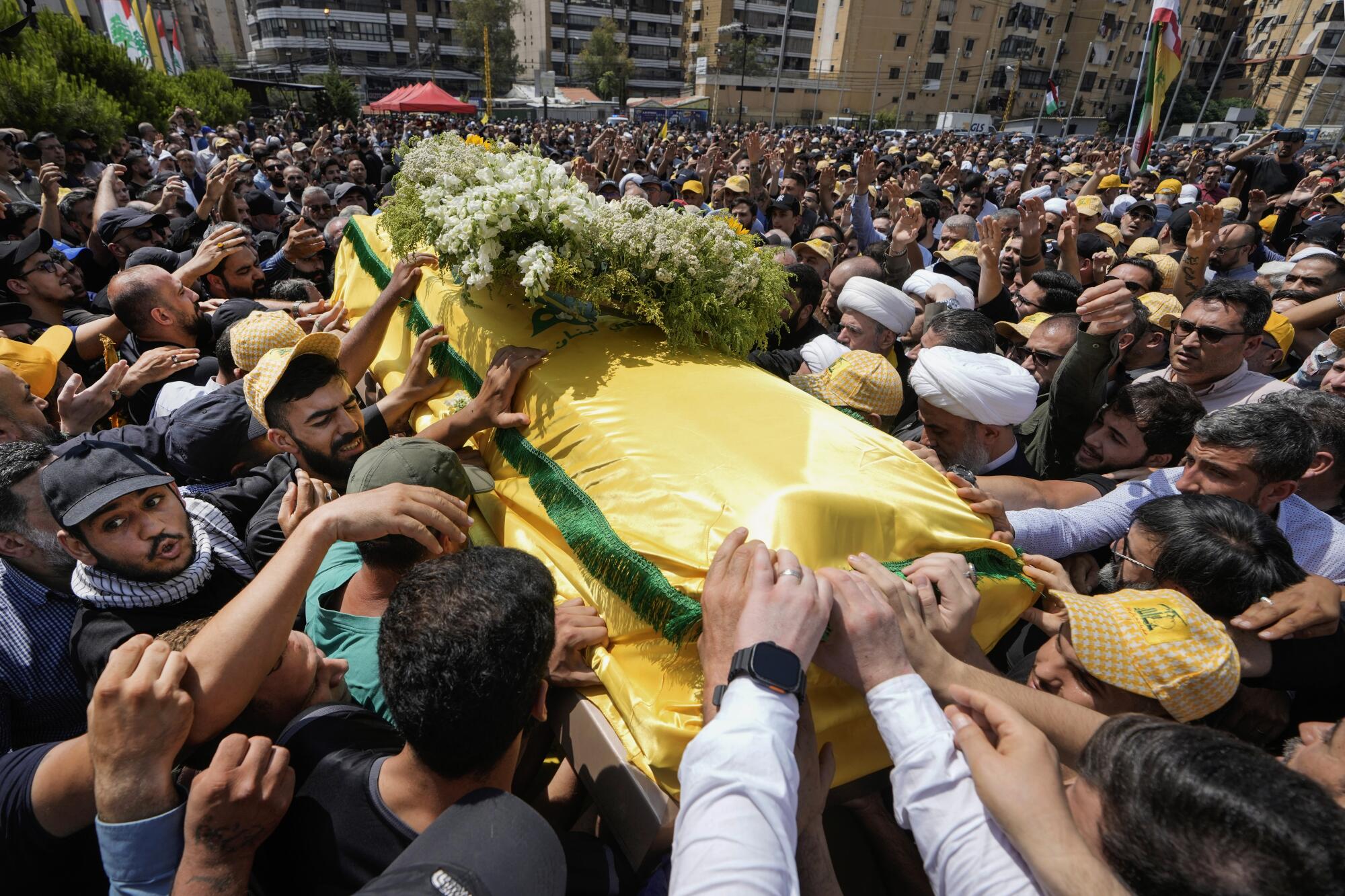
People carry the coffin of top Hezbollah commander Taleb Sami Abdullah, 55, during his funeral on the outskirts of Beirut. He died on June 11, 2024 in an Israeli strike.
(Bilal Hussain/Associated Press)
At the funeral of a senior Hezbollah leader killed by Israel this month, Daoud defiantly said that although his home had been destroyed and his family displaced, they would return and rebuild. To those of his countrymen who questioned Hezbollah’s struggle, he said: “We are a people of resistance. Those who don’t like it should leave Lebanon.”
Nearby was Ali, 33, who works for a protein supplement company and serves as a reservist with Hezbollah. Dressed in fatigues and a purple beret, he said he would fight in the south if called up.
“If someone breaks into your house and attacks it, won’t you do anything?” he said. “The Israelis said they will come here after Gaza. That’s why we stopped them.”
There is talk in Israeli political circles of reoccupying southern Lebanon as a buffer zone against Hezbollah, a development that would almost certainly bring Rmeish under Israeli control.
This will not be the first time. During the Israeli occupation, villages in southern Lebanon such as Rmeish became part of a mini-state supported by Israel. Children of fighting age were required to join the South Lebanese army (many did so voluntarily) and carried out security operations alongside Israeli soldiers, including imprisoning and torturing their fellow countrymen.
Others cut economic ties: every day, some 4,000 Lebanese crossed the border to work in the farms and industrial zones of Galilee and Tel Aviv.
“All the beautiful houses you see in Rmeish were built with this money,” said Najib al-Amil, a 72-year-old priest from the Maronite Church in Rmeish.
“If you were to shout in Hebrew on the street, three-quarters of the people here would respond to you,” said one shopkeeper, who did not want to be identified to avoid persecution.
Few of them would welcome any other occupation.
“I know Israel has plans in this area, but I cannot stop them with a rifle,” Al-Amil said, anger in his voice. “Expand or stop, fight or fight. But now there is no war or peace. It cannot remain like this.”
Young, of the Carnegie Middle East Center, said the reoccupation was aimed at creating a buffer zone against Hezbollah’s long-range arsenal and undermining any security cushion the Israeli military could realistically create in Lebanon.
“There will be no stability in northern Israel until there is stability in southern Lebanon,” Young said. “The best the Israelis can hope for is a negotiated settlement or a return to the status quo.”
So far, Rmeish has stayed out of the war, even when Hezbollah uses the forests and grasslands outside the village to attack Israel. In March, when gunmen went to place a mobile rocket launcher in the village, residents rang the church bell to scare them away; Hezbollah denied involvement, but agreed with village leaders to keep Rmeish out of its area of operations.
This gave residents some comfort, even as the months dragged on and the fighting intensified.
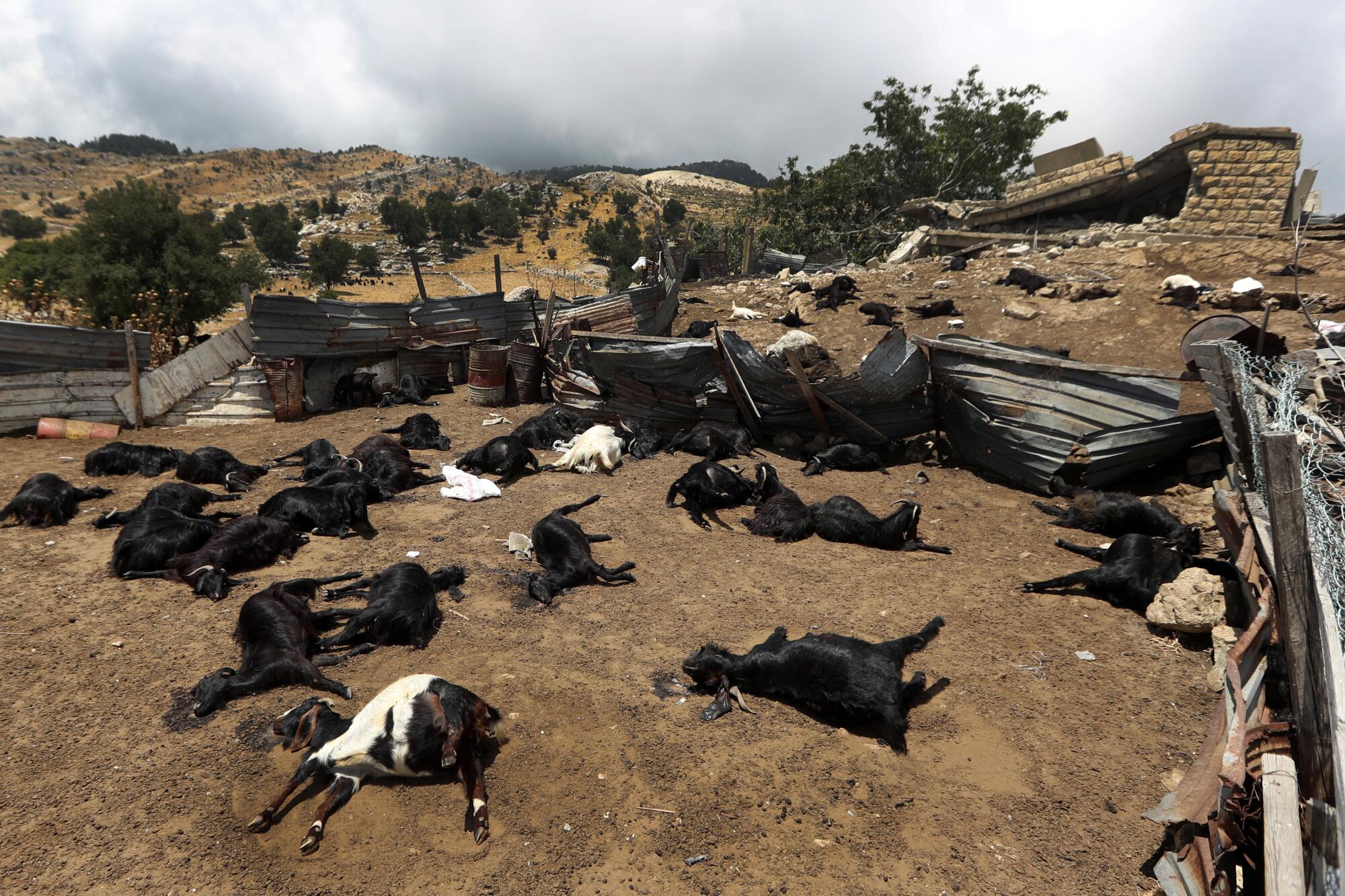
On July 8, 2024, an Israeli airstrike hit a house and killed hundreds of goats in the mountainous region of Tura in southern Lebanon. These attacks occurred in the context of escalating tensions between the Lebanese group Hezbollah and the Israeli army on the border of these countries.
(Muhammad Zaatari/Associated Press)
“If this continues, it’s fine as long as we’re not displaced,” said Allam, a supermarket owner. But he had taken precautions: He would send his two sons, aged 21 and 18, to Munich, Germany, to look for work.
“I wanted them to stay here and build something together in this town that we all love. But everything tells me that there is no future,” he said.
Allam said he sees his presence in Rmeish as a matter of protecting Christians in the area. Come what may, he said, referring to the bullet wounds to the shoulder and stomach he suffered while serving in the army in 2007.
“They should have killed me, so now every day is a new life,” he said. “No matter what happens, I won’t go.”
